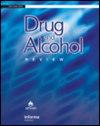Sociocultural context of SMART recovery in Singapore: A qualitative exploration of members and facilitators perspectives and experiences
Abstract
Introduction
Various services and mutual-aid groups, such as SMART Recovery, provide support for substance use rehabilitation in Singapore. Despite this, substance use remains a growing public health concern with a large treatment gap. This suggests potential barriers to accessing substance use treatment unique to Singapore's sociocultural context. Culture can play a significant role in shaping members' experiences. Hence, this study sought to explore members' and facilitators' experiences and perspectives of SMART Recovery within Singapore's sociocultural context.
Methods
A critical realist position guided the present study. Semi-structured, in-depth interviews were conducted with 18 participants (14 members and 4 facilitators) in 2023. Data were analysed using reflexive thematic analysis.
Results
Five themes were generated from the data: (i) Non-disclosure from fear of negative social evaluation; (ii) Stigma and shame surrounding the use of substances; (iii) Linguistic challenges as a barrier to participation; (iv) A ‘second family’ fostered through continued engagement with SMART Recovery; and (v) Facilitation approach and quality affected by sociocultural factors (e.g., sensitivity to relational cues). Although there were initial sociocultural challenges, this improved through continued engagement, and the experience of SMART Recovery was largely positive. Facilitators also identified that their facilitation style is influenced by sociocultural factors, which in turn affects members' experience of SMART Recovery.
Discussion and Conclusions
Members and facilitators in Singapore face sociocultural challenges that influence their experience of SMART Recovery. This study highlights the need to optimise services to the needs of this population. Future research can identify processes of change that foster members’ engagement in SMART Recovery.

 求助内容:
求助内容: 应助结果提醒方式:
应助结果提醒方式:


